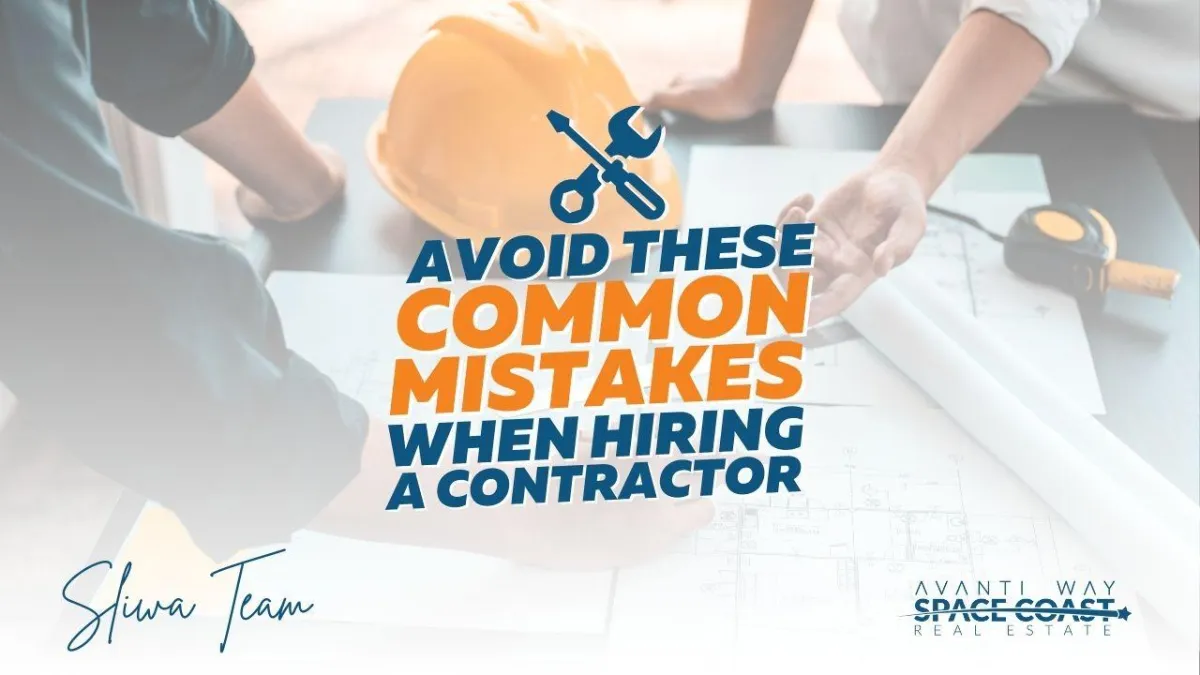BLOG

7 Common Mistakes to Avoid When Hiring a Contractor | Brevard County Real Estate Tips
Avoid These Common Mistakes When Hiring a Contractor
Embarking on home improvements can be both exciting and overwhelming. One of the most critical decisions you'll make is choosing the right contractor to turn your vision into reality. However, many homeowners fall into common pitfalls that lead to delays, unexpected costs, and unsatisfactory results.
In this guide, we’ll explore seven mistakes to avoid when hiring a contractor, from navigating the contractor bidding process to ensuring proper home improvement permits are secured, so your project on Brevard County home runs smoothly.
1. Skipping the Research Phase
If you rush into hiring a contractor without conducting proper research, you risk hiring someone who might not meet your expectations or budget.
What To Do Instead:
Research best practices for your project, from materials to timelines.
Interview multiple contractors and ask about their approach to the project.
Get referrals from trusted sources, and always check reviews. We can provide reliable recommendations for contractors in Brevard County .
2. Choosing Based Solely on Price
Choosing the contractor with the lowest bid might be tempting, but extremely low bids often result in poor-quality work, low-grade materials, or surprise costs.
What To Do Instead:
Consider the contractor's experience and reputation.
Review each bid in detail to ensure clarity on what’s included and excluded.
Remember, choosing a reputable contractor may save you money in the long run.
3. Failing to Confirm Credentials & Insurance
Hiring a contractor without verifying their license and insurance coverage can leave you financially vulnerable.
What To Do Instead:
Always request references from past projects and follow up with those homeowners.
Confirm the contractor holds a valid license in Brevard County.
Ensure they carry proper insurance coverage, including general liability and workers' compensation.
4. Proceeding Without a Written Agreement
A handshake deal might feel simple, but it can lead to misunderstandings, especially when it comes to the scope of work, timelines, or costs.
What To Do Instead:
Always have a written contract before starting the project. This should include scope, materials, timelines, the contractor payment schedule, and warranty details.
Review and clarify any terms you don’t understand before signing.
5. Paying Too Much Upfront
Paying a large sum before work begins can leave you vulnerable if the contractor fails to deliver or disappears.
What To Do Instead:
Avoid contractors who demand a large upfront payment or cash-only deals.
Tie payments to project milestones in your contractor payment schedule.
Never pay in full until you’re completely satisfied with the work.
6. Failing to Get Necessary Permits
Skipping the home improvement permits process may seem like an easy way to save time and money, but it can lead to serious consequences, such as fines, forced removal of the work, or even legal issues.
What To Do Instead:
Discuss required permits with your contractor before starting the project.
Ensure obtaining the permits is included in your written agreement.
Make sure the contractor arranges the necessary inspections to keep your project on track.
7. Ignoring Red Flags After the Project Has Started
If problems arise and your contractor is unwilling to address them, it’s crucial not to ignore these issues.
What To Do Instead:
Keep detailed records of any problems and communication.
Meet with the contractor to discuss the issues and request a solution in writing.
If necessary, consult a legal professional for further advice.
FAQs
What is the contractor bidding process?
The contractor bidding process involves soliciting bids from multiple contractors to understand the costs, materials, and timelines they propose for your project. It’s essential to compare these bids carefully, considering the quality and scope of each proposal.
Why is a contractor payment schedule important?
A contractor payment schedule ensures that payments are tied to project milestones, keeping the contractor accountable and providing financial protection. It also helps avoid overpayment before the job is completed.
Do I need permits for home improvements in Brevard County?
Yes, most home improvement projects in Brevard County, such as electrical, plumbing, or structural changes, require permits. Securing these permits ensures your project complies with local regulations and avoids costly fines or rework.
Bottom Line
Hiring the right contractor is crucial to your home improvement success. By avoiding these common mistakes, you can ensure a smoother process from start to finish. If you need help finding a reputable contractor in Brevard County or want to know how your improvements may affect your home’s value, reach out for a free consultation!
Sources:
GET IN TOUCH!
2825 Business Center Blvd., Suite A-1, Melbourne, FL 32940
Telephone : +1 (321) 425-8552
Web : www.lourdessliwa.com
Email: [email protected]
Follow us!
Follow us!
© 2026 | Avanti Way Space Coast. Privacy Policy

